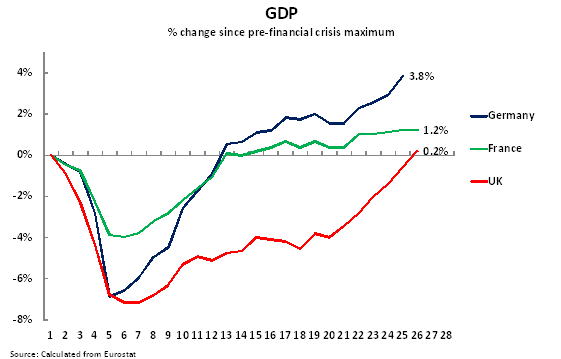The UK needs a clear choice on China relations
- By John Ross
 0 Comment(s)
0 Comment(s) Print
Print E-mail China.org.cn, September 12, 2014
E-mail China.org.cn, September 12, 2014
China and Britain have potentially one of the world's most fruitful international economic relationships. Not only do the two countries together account for 16 percent of world GDP, but their two economies are mutually complimentary rather than competitive.
China is now the world's largest industrial producer, having overtaken the United States, whereas the U.K. is highly specialized in financial and other services. Industrial sectors where the U.K. still retains a strong position, such as high end pharmaceuticals, are not really threatened by competition from China as in these areas it will take a significant period of time for China to build its own technology, expertise and resources. At the same time, China has the world's most cost efficient medium technology manufacturing and the U.K. is one of its top 10 export markets.
China possesses one of the world's most powerful banks, with ICBC being ranked as the world leader on many ratings, and it also has the world's largest annual savings -- the raw material of the financial service industry. But China's banks are extremely interested in internationalizing themselves, while London is highly specialized as a center for international financial operations. China wants to increase the RMB's international use and London is by far the world's most important foreign exchange dealing center, with a turnover higher than New York and Tokyo combined, therefore making Britain an ideal center for China's international RMB operations.
The potential for economic cooperation between the two countries was shown during Chinese Premier Li Keqiang's recent visit to Britain, where multi-billion dollar deals were signed, together with 40-plus intergovernmental agreements and business pacts, covering multiple areas like energy, high-speed trains and finance. After a period of frosty relations, caused by David Cameron's meeting the Tibetan separatist leader the Dalai Lama, political relations between China and Britain warmed significantly this year -- with the U.K. Prime Minister and other British ministers being welcomed to Beijing for official visits.
Given these mutually complimentary economies, one might think it would be rather easy to arrange a "win-win" outcome. This is particularly important for the U.K., as its economy has performed worse than the two other largest European economies, Germany and France, since the international financial crisis began. As shown in the chart, since their pre-international financial crisis peaks, German GDP has increased by 3.8 percent, France by 1.2 percent, but the U.K. by only 0.2 percent.
|
|
But, regrettably, Britain periodically continues to shoot itself in the foot over its relations with China -- inevitably causing damage to the U.K. economy. This has become a more serious obstacle than technical economic questions which remain to be fully resolved -- for example the rules on Chinese banks setting up branches in London. To show the issues involved it is clarificatory to make a comparison with Germany.







Go to Forum >>0 Comment(s)